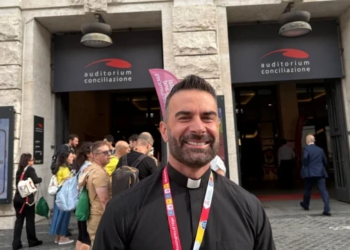Democratic Socialist Zohran Mamdani’s upset win in the New York City Democratic mayoral primary sent shock waves through the city’s business community and around the country. Incumbent Mayor Eric Adams is standing for re-election as an independent, as is Mr. Mamdani’s defeated primary rival, former New York State governor Andrew Cuomo. With Curtis Sliwa — who lost to Mr. Adams, 67 to 28 percent, as the Republican nominee in 2021 — again earning his party’s nomination, a split opposition in an overwhelmingly Democratic city suggests November’s general election may prove to be a Mamdani coronation.
As the incumbent, Mayor Adams, elected as a Democrat, would ordinarily have been expected to easily secure his party’s nomination for re-election. After a criminal corruption case against him was dropped by the Trump Department of Justice in April of this year, the increasingly unpopular mayor announced an independent candidacy, describing the court case as a “distraction” comprised of “false accusations.”
The merits of the legal case against him notwithstanding, Mr. Adams has certainly cut a colorful figure reminiscent of Jimmy Walker, first elected to the New York City mayoralty exactly 100 years ago. The two men share a trail of alleged corruption, a love of the city’s vibrant nightlife, and a predilection for unique utterances. As Mr. Walker once stated, “I’d rather be a lamppost in New York than the mayor of Chicago,” so Mr. Adams has said, “If New York City is the greatest city on the globe, that makes me the greatest mayor on the globe.”
But it is another colorful politician, from a more competitive jurisdiction, who comes to mind with efforts now underway among city business leaders and powerbrokers to consolidate an anti-Mamdani coalition behind Mayor Adams — Edwin Edwards, the four-time Democratic governor of Louisiana.
Louisiana’s ‘Jungle Primary’
In 1991, Louisiana held a “jungle primary” in its gubernatorial contest, with all candidates listed on a single ballot. As no candidate achieved a majority in the first round, a run-off between the top two vote-getters ensued.
The first round of voting faintly echoed the 2025 New York City mayoral campaign. It featured an unpopular incumbent (Buddy Roemer), who had switched to the Republican party in the months preceding the primary. The state Republican convention endorsed another (staunchly pro-life, unlike Mr. Roemer) candidate, U.S. Representative Clyde Holloway. Mr. Edwards was the only Democratic candidate to net more than 1 percent of the vote. But it was a third Republican, David Duke, who would make an otherwise pedestrian state-level election into national news.
Prior to entering politics and serving briefly as a Republican (having also earlier switched parties) member of the Louisiana House of Representatives, Mr. Duke had been the Grand Wizard of the Knights of the Ku Klux Klan. He has since been described by the Anti-Defamation League as “perhaps America’s most well-known racist and anti-Semite.”
Mr. Duke edged Governor Roemer to place second, just behind former Governor Edwards, setting the stage for what should have been a traditional Republican/Democratic tilt in the run-off. It would prove to be anything but.
Republican leaders nationwide — including President George H.W. Bush — condemned Mr. Duke’s candidacy, citing his long history of racism, bigotry, and antisemitism. But Mr. Edwards entered the run-off campaign with problems of his own. A man also blessed with the ability to offer a glib bon mot — he once joked to reporters during a prior election campaign that “the only way I can lose this election is if I’m caught in bed with either a dead girl or a live boy” — Mr. Edwards had been dogged by charges of corruption during three prior terms as governor, and stood trial in federal court in 1985 on fraud and bribery charges (he was ultimately acquitted, but later convicted in 2000 on separate racketeering and extortion charges).
The run-off election campaign was an ugly one, given the candidates’ checkered pasts. Outgoing Governor Roemer — who had successfully run on an “Anyone but Edwards” platform in 1987 — endorsed Edwards. Duke’s long history as a neo-Nazi and white supremacist consolidated support for his opponent, best exemplified by a bumper sticker popular at the time: “Vote For The Crook. It’s Important.”
As the general election for New York City mayor is not a dual-candidate run-off, coherent opposition to a noxious candidate is not as easily aggregated. But with Mr. Cuomo’s shocking primary loss (he led comfortably in pre-election polling) after having previously resigned as governor in disgrace, and the moribund state of the Republican party in New York City (where registered Democrats outnumber Republicans 6 to 1), it would seem Mr. Adams may have the best chance of stopping Mr. Mamdani.
Ultimately, whether the Edwards/Duke analogy holds up should the field narrow may come down to “how corrupt” vs. “how extreme” voters view Messrs. Adams and Mamdani, respectively. Mr. Edwards’s long tenure in government certainly offered far more opportunities for corruption than Mr. Adams’s single term as Mayor.
But perhaps the most direct line between 1991 and today is a less obvious one: will voters see in Mr. Mamdani a charismatic, antisemitic socialist, akin to a certain mid-century German leader idolized by Mr. Duke? In the end, Mr. Edwards prevailed, with the race not particularly close. Voters are prepared to hold their noses and cast an unpleasant vote when the stench is unbearable. What will ultimately smell worse — the false promises of a failed economic ideology, marbled with abhorrent racialism, or standard-issue, big city graft?
Richard J. Shinder is the founder and managing partner of Theatine Partners, a financial consultancy.
READ MORE from Richard J. Shinder:

![Steak ’n Shake Mocks Cracker Barrel Over Identity-Erasing Rebrand [WATCH]](https://www.right2024.com/wp-content/uploads/2025/08/Steak-n-Shake-Mocks-Cracker-Barrel-Over-Identity-Erasing-Rebrand-WATCH-350x250.jpg)




![Mount Rushmore Could Get Trump Upgrade Under GOP Push [WATCH]](https://www.right2024.com/wp-content/uploads/2025/07/Mount-Rushmore-Could-Get-Trump-Upgrade-Under-GOP-Push-WATCH-350x250.jpg)

![Soros Network, Others Behind LA Riots [WATCH]](https://www.right2024.com/wp-content/uploads/2025/06/Soros-Network-Others-Behind-LA-Riots-WATCH-350x250.jpg)
![Human Trafficking Expert Details Horrific Biden Admin Endangerment of Migrant Kids [WATCH]](https://www.right2024.com/wp-content/uploads/2025/07/Human-Trafficking-Expert-Details-Horrific-Biden-Admin-Endangerment-of-Migrant-350x250.jpg)





